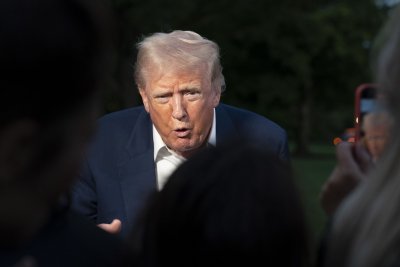First crew of South African refugees to arrive in U.S. under Trump’s plan for white ‘Afrikaners’

The first group of White Afrikaners from South Africa, like the ones pictured here, are set to arrive in the United States after receiving refugee status under the Trump Administration. File Photo by Kim Ludobrook/EPA-EFE
May 12 (UPI) — The first set of 49 w\White South African “Afrikaners” granted refugee status by President Donald Trump will arrive Monday to the United States.
The group departed Johannesburg on Sunday night on a private flight paid for by the U.S. government.
They will arrive Monday in Washington at Dulles Airport before being expatriated to multiple states, including Texas, Minnesota, Nevada and Idaho, where they will be on a pathway to U.S. citizenship and eligible for government benefits.
Trump threatened in February to cut all U.S. funding to South Africa seemingly over its land expropriation law, which allows local, provincial and national authorities to confiscate land if it is in the public interest and in few specific cases without compensation.
The American president has claimed without evidence that South Africa is taking land from White Afrikaners, who Trump went on to claim were victims of “racial discrimination” and “large-scale killings” of White South African farmers.
“Your case manager will pick you up from the airport and take you to housing that they have arranged for you,” read a document in part for the arriving South Africans. “This housing may be temporary (like a hotel) while a local organization helps you identify more long-term housing,” it added.
According to the South African government, it has not expropriated any land.
On Monday, South Africa Foreign Minister Ronald Lamola said “there is no persecution of White Afrikaner South Africans,” adding how police reports debunked Trump’s false assertion.
The law states property cannot be expropriated arbitrarily and can only be seized if an agreement with the owner cannot be reached, subject to “just and equitable compensation” being paid.
Meanwhile, South Africa’s government said the Afrikaners, who are largely descended from Dutch settlers from the Netherlands in western Europe, wouldn’t be stopped from going, albeit under a false narrative.”
“You are expected to support yourself quickly in finding work,” U.S. immigration documents said. “Adults are expected to accept entry-level employment in fields like warehousing, manufacturing, and customer service. You can work toward higher-level employment over time,” they were informed.
Elon Musk, who was born in South Africa, has accused Ramaphosa’s government of “openly pushing for genocide of white people” despite any evidence.
In March, Secretary of State Marco Rubio expelled South Africa’s ambassador to the U.S. Ebrahim Rasool for “race-baiting” following remarks accusing the United States of engaging in “supremacist” policies domestically and globally as South Africa has joined other nations in accusing Israeli Prime Minister Benjamin Netanyahu of committing acts of genocide of Palestinians in Gaza.
“There’s no legal or any factual basis for the executive order sanctioning this action,” Vincent Magwenya, a spokesman for South African President Cyril Ramaphosa, told NPR after learning of the granting of refugee status.
“None of the provisions of international law on the definition of refugees are applicable in this case,” he said, adding that South Africa’s sovereignty as a country was being “grossly undermined and violated” by the U.S. in a way that was “disturbing.”
According to the World Bank, inequality is among the world’s highest in South Africa which had segregationist policies via “apartheid” that only began to fully unravel in the early 1990s.
A 2017 land audit report found that White South Africans own 72% of all farm and agricultural land, while Black South Africans owned 15%.
As of 2022, White South Africans account for less than 8% of its population of more than 63 million.
Scores of South African civilians, meanwhile, took to social media to post comedic memes and videos expressing doubt over the plight of the Afrikaners, joking how they will miss “privileged lives, domestic workers and beach holidays.”
Max du Preez, a white Afrikaner author, told BBC that the claims of persecution of white South Africans were a “total absurdity” and “based on nothing.”
A U.S. government employee, while not authorized to speak to reporters, told NPR what they considered this was “immigration fraud” after the Trump administration effectively suspended America’s refugee admission program.


